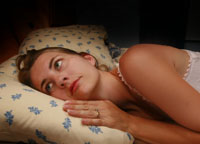Both lack of sleep and too much sleep can do damage to one’s health, study finds
Researchers from the University of Warwick and University College London recently completed a study commissioned by the British Sleep Society. The study involved more than ten thousand residents of the United Kingdom. The research was aimed at finding a correlation between the average number of hours participants slept a night and the condition of their cardiovascular systems and blood vessels.

The findings indicate that the risk of death from a cardiovascular problem doubles for those suffering from constant lack of sleep. A constant lack of sleep results in higher blood pressure, which increases the risk of a cardiac infarction or a stroke.
Women who sleep less than five hours a night are twice as likely to develop hypertension as men whose sleep duration is the same. The findings indicate that individuals who cut their sleeping to five hours or less a night face a 1.7-fold increased risk in death from all causes. Researchers believe a lack of sleep may be also associated with the increased risk of gaining weight and developing type II diabetes.
These days nearly 40 million Britons have difficulties falling asleep. Besides, one out of three persons in the group suffers from the so-called “low-quality sleep” syndrome i.e. a person can only drowse instead of having a good sleep. The hectic rhythm of today’s world does not allow people to get enough sleep, said Professor Francesco Cappuccio, one of the authors of the study. Americans are no strangers to sleep disorders either. According to data released by the U.S. National Sleep Foundation, as many as 70 million Americans are affected by a lack of sleep. “One third of Britain’s population and more than 40 percent of U.S. residents cut their sleeping to less than five hours a night… That’s why we can hear people frequently complain of feeling tired, weary and drowsy throughout the day,” Prof. Cappuccio said.
It should be noted that the issue of sleep or the lack of it, for that matter, is no laughing matter for lots of Russians too. A recent study says that around 45 percent of Russians suffer from occasional attacks of insomnia, whereas 20 percent cannot beat it at all.
“Unfortunately, people all over the world are making the same mistake these days – they sleep very little during their workweek and take a long lie-in on the weekend. They’d better stop doing so. The habit will lead to the development of drowsiness. It’s understood that you’ll have trouble focusing on you work when you feel drowsy all the time. Besides, your general condition will worsen and a number of health problems may follow. A person who is woozy from lack of sleep is more prone to accidents while driving a vehicle or operating a lathe. In short, you are likely to take a turn for the worse in your life if you feel constantly drowsy. You’ll be suffering from frequent mood swings, and some of your faculties, namely, memory and concentration will be affected too,” said Professor Gennadi Kovrov, an expert in somnology from the neurology department of one of the Moscow-based medical research centers.
British researchers also found that too much sleep can be as hazardous to one’s health as a lack of sleep. Sleeping too little or sleeping too much can more than double the risk of death in individuals, according to the study. As regards some of the reasons for too much sleep, researchers believe the condition may indicate depression and cancer-related fatigue.
“In terms of prevention, our findings indicate that consistently sleeping around seven hours per night is optimal for one’s health,” Prof. Cappuccio said in a news release. It is noteworthy that people slept up to ten hours a day before Thomas Alva Edison invented an incandescent lamp. And they seem to have slept fairly well.
Not only how long a person usually sleeps that matters, the time at which he regularly wakes up plays an important role too, according to a study by Japanese researchers. Their findings indicate that an early awakening has no beneficial effect whatsoever on one’s health. Besides, early risers may run a higher risk of developing cardiovascular problems, said the authors of the study which involved more than three thousand people aged from 23 to 90.
All and all, we should not forget about the beneficial effects of sleep on our health. It should be noted that just one night without sleep can reduce the intensity of the brain’s activity by 9 percent. The physical power of the body recovers and the activity of its systems and organs stabilize during a period of sleep. Besides, sleep can put in order all the pieces of information a person receives during the day. That is probably why the Russian chemist Dmitri Mendeleev saw the basics of periodic law in his dream. Therefore, make sure that you have a good night’s sleep, at least eight hours a night.
Strana.ru
Translated by Guerman Grachev
Pravda.ru
Subscribe to Pravda.Ru Telegram channel, Facebook, RSS!


